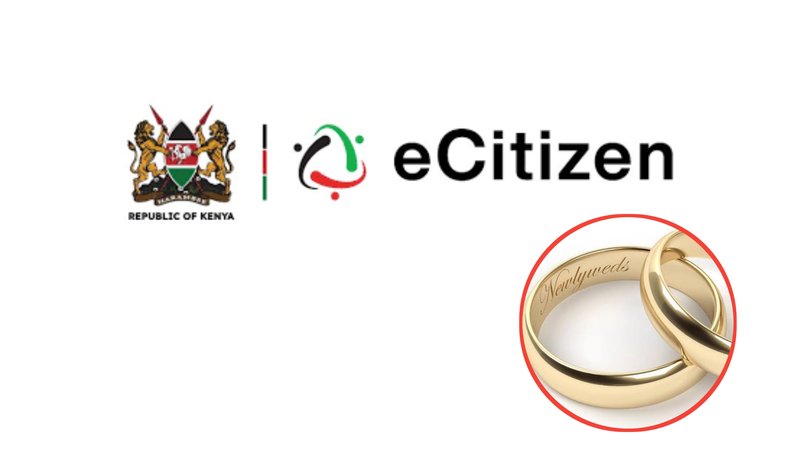
The Complete Guide to Marriage Certificates in Kenya: Everything You Need to Know in 2025
By Jonathan Mwaniki
Marriage is one of life’s most significant milestones, and in Kenya, obtaining a marriage certificate is crucial for legal recognition of your union. Whether you’re planning your dream wedding or need to understand the legal requirements, this comprehensive guide covers everything about marriage certificates in Kenya and across Africa.
How to Obtain a Marriage Certificate in Kenya
Getting a marriage certificate in Kenya has become more streamlined with the introduction of digital services through the eCitizen platform. Here’s the step-by-step process:
Requirements for Marriage Certificate Application
Basic Requirements:
- Both parties must be 18 years or older
- Must be of sound mind and able to give consent
- Cannot be closely related by blood or marriage
- Must not be married to someone else
Required Documents:
- Valid identification (National ID or passport for both parties)
- Birth certificates for both partners
- Two passport-sized photographs each
- Proof of single status (affidavit)
- Death certificate (if widowed) or divorce decree (if previously married)
- For foreigners: Certificate of No Impediment from home country
Online Application Process
Step 1: Visit eCitizen Platform Go to www.ecitizen.go.ke and create an account or log in to your existing account.
Step 2: Select Marriage Services Navigate to “Civil Registration” and select “Marriage Certificate Application.”
Step 3: Choose Marriage Type Select from:
- Civil Marriage
- Christian Marriage
- Hindu Marriage
- Islamic Marriage
- Customary Marriage
Step 4: Complete Application Form Fill in all required details for both parties, including personal information, parents’ details, and witness information.
Step 5: Upload Documents Upload all required documents in the specified formats.
Step 6: Submit Notice of Marriage Download, sign, and upload the Notice of Marriage (21-day notice period required for most marriages).
Step 7: Pay Fees Complete payment through the available online payment methods.
Step 8: Attend Interview Book an appointment with the Registrar for document verification and interview.
How Marriage Certificates Work in Kenya
A marriage certificate in Kenya serves as legal proof of your union and provides several benefits:
Legal Recognition
- Establishes your marital status for official purposes
- Recognized by all government institutions
- Valid for international use when properly legalized
Rights and Benefits
- Property ownership rights
- Inheritance rights
- Medical decision-making authority
- Immigration benefits for foreign spouses
- Insurance and employment benefits
- Child custody rights
Registration Process
Once your marriage is solemnized:
- The marriage officer completes and signs the certificate
- Both parties and witnesses sign the certificate
- A copy is submitted to the Registrar of Marriages within 14 days
- The marriage is recorded in the official register
Types of Marriages in Kenya
Kenya’s Marriage Act of 2014 recognizes five types of marriages:
1. Civil Marriages
- Conducted by a government registrar
- Secular in nature
- Monogamous only
- Most common type
2. Christian Marriages
- Performed by licensed Christian ministers
- Conducted in churches or approved venues
- Monogamous only
- Must follow Christian rites
3. Hindu Marriages
- For persons professing Hindu faith
- Includes Sikhs, Jains, and Buddhists
- Monogamous only
- Conducted according to Hindu rites
4. Islamic Marriages
- For persons professing Islamic faith
- Can be polygamous
- Conducted according to Islamic law
- Performed by licensed Islamic clergy
5. Customary Marriages
- Based on traditional African customs
- Can be polygamous
- Must be registered within 90 days
- Requires community recognition
Marriage Certificate Costs in Kenya (2025)
The cost of obtaining a marriage certificate in Kenya has undergone significant changes:
Current Fee Structure
- Basic Registration: Previously Ksh 5,000, increased to Ksh 50,000 (currently suspended by court order)
- Notice of Marriage: Ksh 600
- Marriage Ceremony: Ksh 2,000-7,200 depending on venue
- Certificate Issuance: Ksh 500
- Certified Copy: Ksh 1,100
Special License Fees
- Christian/Hindu Special License: Ksh 10,150
- Civil Special License: Ksh 7,200-14,200 depending on venue
Note: The significant fee increase to Ksh 50,000 has been temporarily suspended by the High Court following a legal challenge.
Why You Need a Marriage Certificate in Kenya
Legal Protection
A marriage certificate provides crucial legal protection:
- Property Rights: Establishes joint ownership and inheritance rights
- Medical Decisions: Grants authority to make medical decisions for your spouse
- Legal Representation: Allows you to represent your spouse in legal matters
Financial Benefits
- Access to spousal employment benefits
- Insurance coverage extensions
- Joint bank accounts and loans
- Pension and social security benefits
Immigration Benefits
- Dependent Passes: Foreign spouses can apply for residency
- Permanent Residence: Available after 3 years of marriage
- Citizenship: Available after 7 years for foreign spouses
- Family Visas: Facilitates family immigration processes
Court Precedents
Recent court cases have emphasized the importance of marriage certificates:
- Cohabitation and having children together is not proof of marriage
- Courts require documentary evidence of marriage for property disputes
- Only registered marriages are recognized for spousal rights
Marriage Statistics and Trends in Kenya
Current Statistics (2024)
- Total marriages registered: 15,045 (down from 20,600 in 2023)
- Nairobi leads with 5,826 marriages (39.6% of all registrations)
- Christian and Civil marriages dominate registrations
- Only 19.3% of married women have registered their marriages
Changing Patterns
- Marriage rates among women (15-49) dropped from 63.1% (1989) to 48.1% (2022)
- Divorce rates increased from 4.6% (1989) to 9.3% (2022)
- Urban areas show higher formal registration rates
Regional Variations
Highest Registration Counties:
- Nairobi: 5,826 marriages
- Kiambu: 4,844 marriages
- Machakos: 4,807 marriages
- Nakuru: 3,819 marriages
- Uasin Gishu: 3,179 marriages
Lowest Registration Counties:
- Wajir: 8 marriages
- Turkana: 16 marriages
- Lamu: 20 marriages
Marriage Laws Across Africa
Common Patterns
Most African countries follow similar marriage registration systems inherited from colonial laws:
Recognized Marriage Types
- Civil Marriages: Government-officiated, monogamous
- Religious Marriages: Christian, Islamic, Hindu
- Customary Marriages: Traditional African customs
- Mixed Systems: Combination of civil and customary law
Regional Differences
East Africa
- Kenya: 5 types recognized, registration mandatory
- Uganda: Similar system with civil, Christian, Muslim, and customary marriages
- Tanzania: Minimum age 18 for boys, 15 for girls (being reformed)
Southern Africa
- South Africa: Recognizes civil, customary, and civil unions
- Botswana: 18 years minimum, excludes customary/religious marriages
- Zimbabwe: 18 years for both genders, no exceptions
West Africa
- Nigeria: Federal system with state variations
- Ghana: Similar to Kenya’s system
- Burkina Faso: Permits polygyny with spousal consent
Challenges Across Africa
- Low Registration Rates: Many marriages remain unregistered
- Rural Access: Limited registration offices in rural areas
- Cost Barriers: Registration fees prohibitive for many
- Legal Pluralism: Conflicts between customary and statutory law
- Gender Inequality: Different minimum ages for boys and girls in some countries
Challenges and Solutions in Kenya
Current Challenges
- Low Registration Rates: Only 19.3% of married women have certificates
- High Costs: Recent fee increases deterring registrations
- Bureaucracy: Manual processes causing delays
- Corruption: Reports of officials demanding bribes
- Rural Access: Limited registration offices outside major cities
Digital Solutions
The government is addressing these challenges through:
- eCitizen Platform: Online application and payment
- Mobile Services: Plans for mobile registration units
- Digital Certificates: Electronic certificate issuance
- Transparency: Online tracking of applications
Recommendations
- Maintain Affordable Fees: Keep costs accessible to all Kenyans
- Expand Rural Services: Increase registration points in rural areas
- Public Awareness: Educate citizens on importance of registration
- Streamline Processes: Fully digitize the registration system
- Legal Reforms: Address gaps in customary marriage registration
Steps to Register Different Types of Marriages
Civil Marriage Registration
- Submit 21-day notice of marriage
- Wait for notice period (objections possible)
- Book appointment with registrar
- Attend ceremony with two witnesses
- Sign marriage register
- Receive marriage certificate
Christian Marriage Registration
- Approach licensed minister
- Church banns read for 3 weeks
- Complete church requirements
- Marriage ceremony conducted
- Minister registers marriage
- Certificate issued and recorded
Customary Marriage Registration
- Complete traditional ceremonies
- Notify Registrar within 90 days
- Provide proof of customary rites
- Submit required documentation
- Pay registration fees
- Receive customary marriage certificate
Islamic Marriage Registration
- Complete Islamic marriage ceremony
- Ensure imam is licensed officiant
- Submit marriage details to registrar
- Provide Islamic law compliance proof
- Complete registration process
- Receive marriage certificate
International Recognition and Legalization
For Use Abroad
To use your Kenyan marriage certificate internationally:
- Obtain Certified Copy from Registrar of Marriages
- Authentication by Ministry of Foreign Affairs
- Apostille/Legalization by receiving country’s embassy
- Translation if required by destination country
Foreign Marriage Registration in Kenya
Kenyans married abroad can register their marriage in Kenya:
- Apply to Registrar of Marriages
- Provide original foreign marriage certificate
- Submit certified translation (if not in English)
- Pay prescribed fees
- Receive recognition under Kenyan law
Future of Marriage Registration in Kenya
Planned Improvements
- Full Digitization: Complete online process
- Blockchain Technology: Secure, tamper-proof records
- Mobile Applications: Smartphone-based applications
- Real-time Processing: Instant certificate issuance
- Integration: Links with other government systems
Policy Directions
- Simplified Procedures: Reducing bureaucratic steps
- Cost Reduction: Making registration more affordable
- Rural Expansion: Mobile registration services
- Legal Harmonization: Aligning all marriage laws
Conclusion
Marriage certificates in Kenya are essential legal documents that provide numerous benefits and protections. While the system has faced challenges with cost increases and bureaucratic hurdles, ongoing digitization efforts through eCitizen are making the process more accessible. The key to a successful marriage registration is understanding the requirements, preparing all necessary documents, and following the correct procedures for your chosen type of marriage. With proper planning and preparation, couples can navigate the system effectively and secure their legal union.
Remember that marriage registration is not just a bureaucratic requirement – it’s an investment in your future together, providing legal protection and numerous benefits that will serve you throughout your married life.
For the most current information on marriage registration fees and procedures, always check the official eCitizen platform and the Office of the Attorney General and Department of Justice.
About the Author: Jonathan Mwaniki is a legal blogger and author specializing in family law and civil registration in Kenya. He provides practical guidance on navigating Kenya’s legal systems for everyday citizens.

